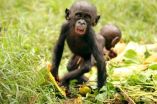(Press-News.org) Bonobos voluntarily share food and will even forego their own meals for a stranger, but only if the recipient offers them social interaction, according to research published January 2 by Jingzhi Tan and Brian Hare of Duke University.
In a series of experiments, the researchers found that bonobos would voluntarily forego their food and offer it to a stranger in exchange for social interaction. The authors found that the bonobos' behavior was at least partially driven by unselfish motivations, since the animals helped strangers acquire food that was out of reach even when no social interaction was possible as a result of helping them. However, their generosity had its limits: Animals would not share food in their possession if no social interaction was possible.
Though the study subjects were all bonobos that had been orphaned by the bushmeat trade in Congo, they showed no significant psychological differences from bonobos that had been raised by their mothers. According to the authors, their results reveal the evolution of generosity in these apes, our closest living relatives. They suggest that the behavior may have evolved to allow for the expansion of individual social networks.
Lead author Tan adds, "Our results show that generosity toward strangers is not unique to humans. Like chimpanzees, our species would kill strangers; like bonobos, we could also be very nice to strangers. Our results highlight the importance of studying bonobos to fully understand the origins of such human behaviors."
INFORMATION:
Citation: Tan J, Hare B (2013) Bonobos Share with Strangers. PLOS ONE 8(1): e51922. doi:10.1371/journal.pone.0051922
Financial Disclosure: This work was supported by the ERC #233297 and NSF-BCS-27552; NSF-BCS-25172 to Brian Hare. The funders had no role in study design, data collection and analysis, decision to publish, or preparation of the manuscript.
Competing Interest Statement: The authors have declared that no competing interests exist.
PLEASE LINK TO THE SCIENTIFIC ARTICLE IN ONLINE VERSIONS OF YOUR REPORT (URL goes live after the embargo ends): http://dx.plos.org/10.1371/journal.pone.0051922
Food for friendship: Bonobos share with strangers in exchange for company
Bonobos share food, will forgo their own meals for the company of strangers
2013-01-03
ELSE PRESS RELEASES FROM THIS DATE:
ALMA sheds light on planet-forming gas streams
2013-01-03
Astronomers using the Atacama Large Millimeter/submillimeter Array (ALMA) telescope have seen a key stage in the birth of giant planets for the first time. Vast streams of gas are flowing across a gap in the disc of material around a young star. These are the first direct observations of such streams, which are expected to be created by giant planets guzzling gas as they grow. The result is published on 2 January 2013 in the journal Nature.
The international team of astronomers studied the young star HD 142527, over 450 light-years from Earth, which is surrounded by a ...
Nature: Political action the biggest swing factor in meeting climate targets
2013-01-03
The new study, published today in the journal Nature, examined the probability of keeping average global temperatures from rising more than 2°C above preindustrial levels under varying levels of climate policy stringency, and thus mitigation costs. In addition, the study for the first time quantified and ranked the uncertainties associated with efforts to mitigate climate change, including questions about the climate itself, uncertainties related to future technologies and energy demand, and political uncertainties as to when action will be taken.
The climate system itself ...
Our galaxy's 'geysers' are towers of power
2013-01-03
VIDEO:
This is Ettore Carretti talking about how the telescope makes maps of the sky.
Click here for more information.
"Monster" outflows of charged particles from the centre of our Galaxy, stretching more than halfway across the sky, have been detected and mapped with CSIRO's 64-m Parkes radio telescope.
Corresponding to the "Fermi Bubbles" found in 2010, the outflows were detected by astronomers from Australia, the USA, Italy and The Netherlands. The finding is reported ...
Study refutes accepted model of memory formation
2013-01-03
A study by Johns Hopkins researchers has shown that a widely accepted model of long-term memory formation — that it hinges on a single enzyme in the brain — is flawed. The new study, published in the Jan. 2 issue of Nature, found that mice lacking the enzyme that purportedly builds memory were in fact still able to form long-term memories as well as normal mice could.
"The prevailing theory is that when you learn something, you strengthen connections between your brain cells called synapses," explains Richard Huganir, Ph.D., a professor and director of the Johns Hopkins ...
ALMA shows how young star and planets grow simultaneously
2013-01-03
Astronomers have used the ALMA telescope to get their first glimpse of a fascinating stage of star formation in which planets forming around a young star are helping the star itself continue to grow, resolving a longstanding mystery. The young system, about 450 light-years from Earth, is revealing its complex gravitational dance to the ever-sharpening vision of the Atacama Large Millimeter/submillimeter Array (ALMA), scheduled for completion this year.
As young stars gather material from their surrounding clouds of gas and dust, the incoming material forms a flat, spinning ...
Galactic geysers fuelled by star stuff
2013-01-03
Enormous outflows of charged particles from the centre of our Galaxy, stretching more than halfway across the sky and moving at supersonic speeds, have been detected and mapped with CSIRO's 64-m Parkes radio telescope.
Corresponding to the "Fermi Bubbles" found in 2010, the recent observations of the phenomenon were made by a team of astronomers from Australia, the USA, Italy and The Netherlands, with the findings reported in today's issue of Nature.
"There is an incredible amount of energy in the outflows," said co-author Professor Lister-Staveley-Smith from The University ...
The laws of global warming
2013-01-03
With policymakers and political leaders increasingly unable to combat global climate change, more scientists are considering the use of manual manipulation of the environment to slow warming's damage to the planet.
But a University of Iowa law professor believes the legal ramifications of this kind of geo-engineering need to be thought through in advance and a global governance structure put in place soon to oversee these efforts.
"Geo-engineering is a global concern that will have climate and weather impacts in all countries, and it is virtually inevitable that some ...
Communication is key to medication adherence
2013-01-03
Even the best medicines in the world can be rendered ineffective if they are not taken as prescribed. The problem known as medication "non-adherence" is a major health issue in the United States, contributing to worse outcomes for people who have diabetes and other chronic diseases.
Now a study led by researchers at the University of California, San Francisco (UCSF), San Francisco General Hospital and Trauma Center (SFGH) and the Kaiser Permanente Division of Research has identified a significant factor that contributes to poor drug adherence – ineffective communication.
Described ...
Bisexual men on the 'down low' run risk for poor mental health
2013-01-03
January 2, 2013 -- Bisexual men are less likely to disclose and more likely to conceal their sexual orientation than gay men. In the first study to look at the mental health of this population, researchers at Columbia University's Mailman School of Public Health found that greater concealment of homosexual behavior was associated with more symptoms of depression and anxiety.
The study published in the American Psychological Association's Journal of Consulting and Clinical Psychology, examined bisexual men "on the down low," a subgroup of bisexual men who live predominantly ...
Common data determinants of recurrent cancer are broken, mislead researchers
2013-01-03
In order to study the effectiveness or cost effectiveness of treatments for recurrent cancer, you first have to discover the patients in medical databases who have recurrent cancer. Generally studies do this with billing or treatment codes – certain codes should identify who does and does not have recurrent cancer. A recent study published in the journal Medical Care shows that the commonly used data determinants of recurrent cancer may be misidentifying patients and potentially leading researchers astray.
"For example, a study might look in a database for all patients ...
LAST 30 PRESS RELEASES:
Scientists discover why we know when to stop scratching an itch
A hidden reason inner ear cells die – and what it means for preventing hearing loss
Researchers discover how tuberculosis bacteria use a “stealth” mechanism to evade the immune system
New microscopy technique lets scientists see cells in unprecedented detail and color
Sometimes less is more: Scientists rethink how to pack medicine into tiny delivery capsules
Scientists build low-cost microscope to study living cells in zero gravity
The Biophysical Journal names Denis V. Titov the 2025 Paper of the Year-Early Career Investigator awardee
Scientists show how your body senses cold—and why menthol feels cool
Scientists deliver new molecule for getting DNA into cells
Study reveals insights about brain regions linked to OCD, informing potential treatments
Does ocean saltiness influence El Niño?
2026 Young Investigators: ONR celebrates new talent tackling warfighter challenges
Genetics help explain who gets the ‘telltale tingle’ from music, art and literature
Many Americans misunderstand medical aid in dying laws
Researchers publish landmark infectious disease study in ‘Science’
New NSF award supports innovative role-playing game approach to strengthening research security in academia
Kumar named to ACMA Emerging Leaders Program for 2026
AI language models could transform aquatic environmental risk assessment
New isotope tools reveal hidden pathways reshaping the global nitrogen cycle
Study reveals how antibiotic structure controls removal from water using biochar
Why chronic pain lasts longer in women: Immune cells offer clues
Toxic exposure creates epigenetic disease risk over 20 generations
More time spent on social media linked to steroid use intentions among boys and men
New study suggests a “kick it while it’s down” approach to cancer treatment could improve cure rates
Milken Institute, Ann Theodore Foundation launch new grant to support clinical trial for potential sarcoidosis treatment
New strategies boost effectiveness of CAR-NK therapy against cancer
Study: Adolescent cannabis use linked to doubling risk of psychotic and bipolar disorders
Invisible harms: drug-related deaths spike after hurricanes and tropical storms
Adolescent cannabis use and risk of psychotic, bipolar, depressive, and anxiety disorders
Anxiety, depression, and care barriers in adults with intellectual and developmental disabilities
[Press-News.org] Food for friendship: Bonobos share with strangers in exchange for companyBonobos share food, will forgo their own meals for the company of strangers

